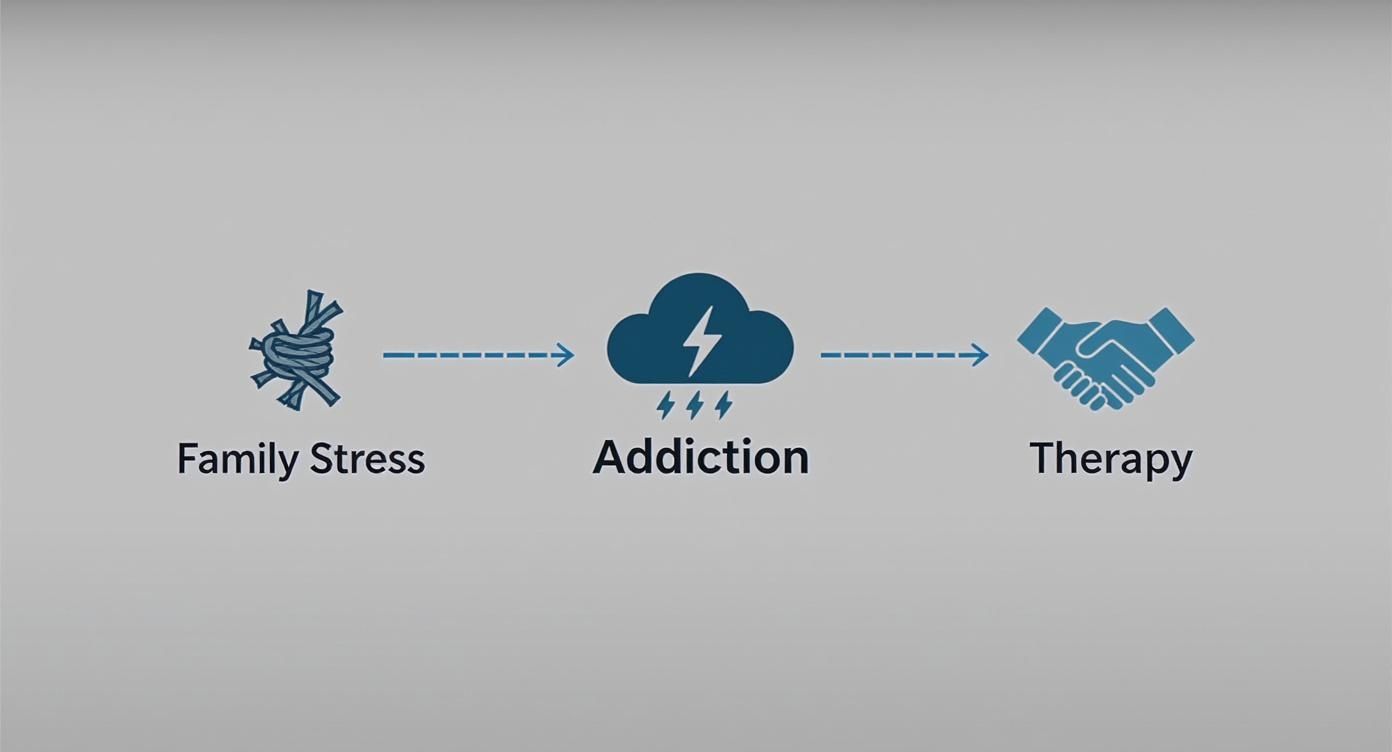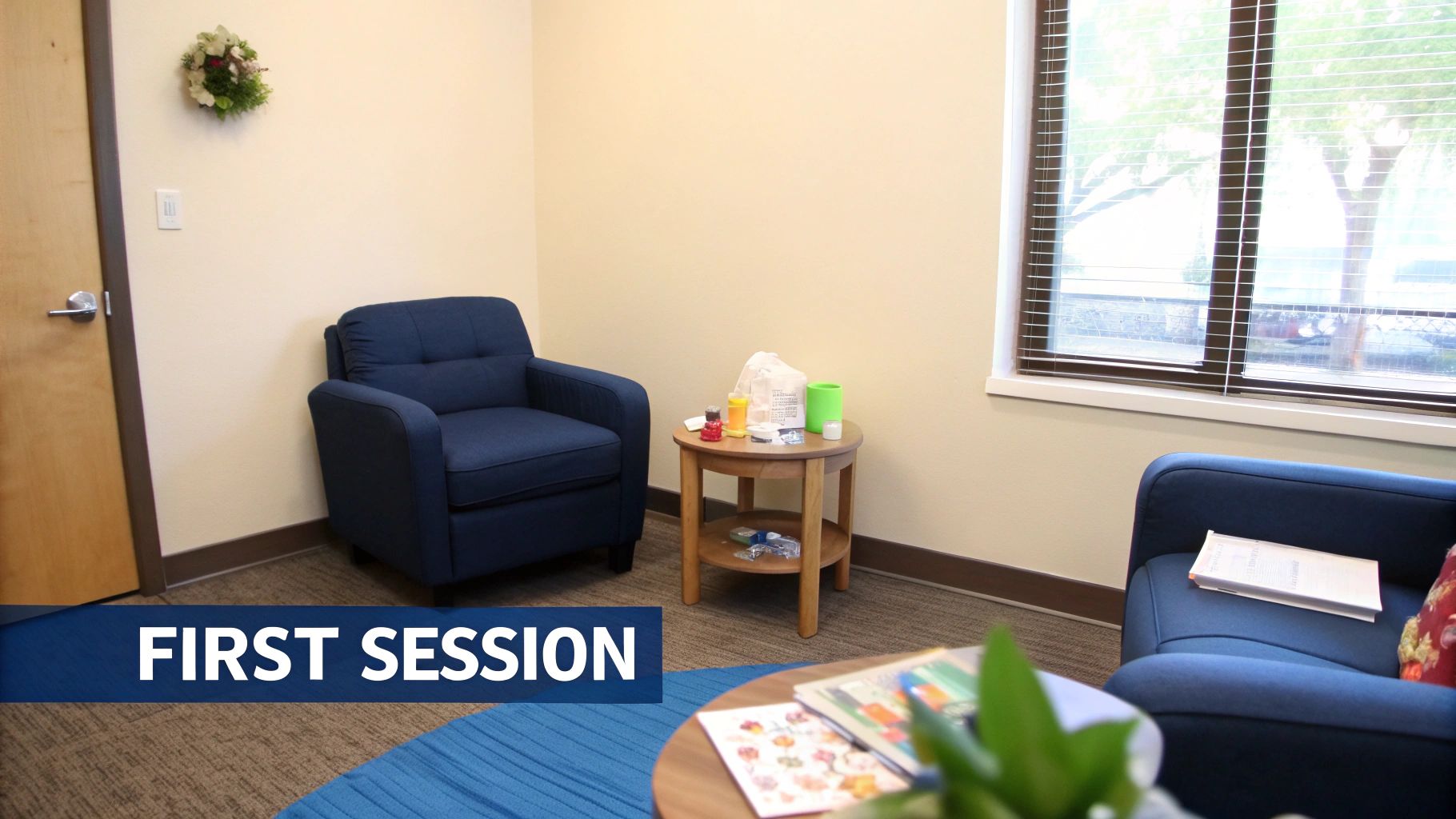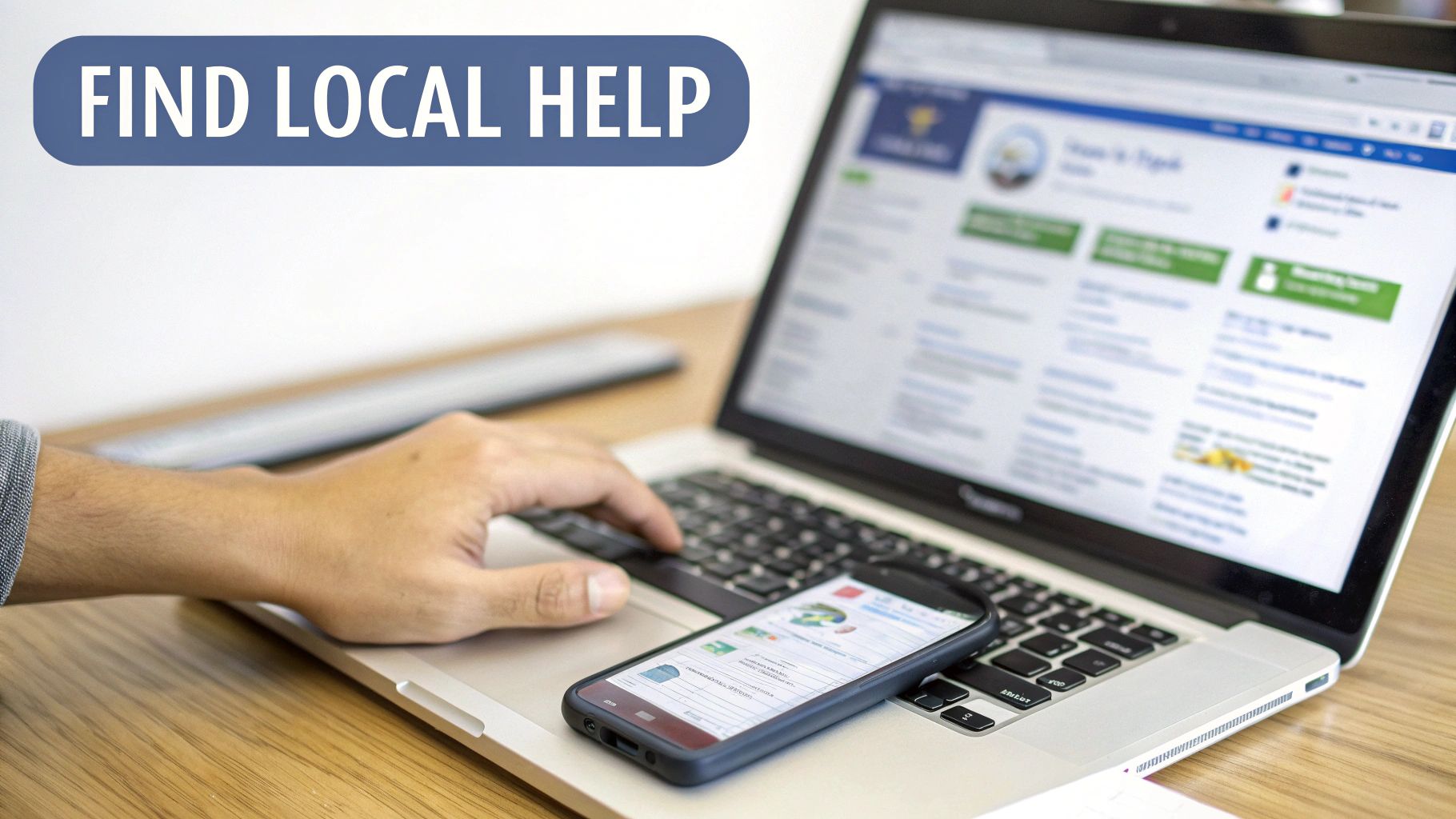When one person in a family is caught in the grip of addiction, it's never a solo journey. The ripple effects touch everyone, creating a system-wide problem that requires a system-wide solution. This is where family therapy for substance abuse comes in—it’s a specialized type of counseling that shifts the focus from an "individual problem" to a family challenge. It brings everyone together with a professional guide to mend broken relationships and build a powerful, united front for a lasting recovery.
Key Takeaways
- Family Therapy Treats the Whole System: It recognizes that substance abuse affects every family member, not just the individual. Healing the family unit is crucial for sustainable recovery.
- Specific Models Offer Proven Roadmaps: Therapies like Behavioral Couples Therapy (BCT), Multisystemic Therapy (MST), and Community Reinforcement and Family Training (CRAFT) provide evidence-based strategies tailored to different family situations.
- Healing Can Start Even if Your Loved One Refuses Help: The CRAFT model, in particular, empowers family members to make positive changes and learn how to encourage their loved one toward treatment.
- Integration is Key: Family therapy is most effective when integrated into a comprehensive treatment plan, such as an outpatient program, to turn the home environment into a strong support system.
Healing Your Family Through Therapy
Addiction can feel like it’s turned your family upside down, leaving a trail of shattered trust, strained communication, and deeply rooted resentments. Family therapy provides the tools and the safe space to start rebuilding. Think of it as a guided process for repairing your family's foundation, one honest conversation at a time. The ultimate goal is to transform the family environment from a potential source of stress into the single most effective support system your loved one has.

A Path to Collective Healing
This guide will walk you through what this approach looks like in the real world, how to find the right help, and what it takes to forge stronger, healthier family bonds. We'll look at how families right here in Massachusetts are discovering a new sense of hope and healing together. We'll dig into why family involvement isn't just helpful—it's often essential—and what you should expect as you start this process.
The core idea is that even if only one person uses substances, the entire family is affected and, therefore, the entire family can be a part of the solution.
This isn't about placing blame. It's about understanding the complex ways addiction rewires how a family operates. Often, without even realizing it, patterns like enabling or codependency take hold. By learning new skills as a unit, you can start to identify and change these dynamics, making the entire family more resilient and better prepared to support each other through the ups and downs of recovery.
By the time you finish this guide, you’ll have a clear picture of:
- Why getting the family involved is such a critical piece of the recovery puzzle.
- The specific therapy models with a proven track record for treating addiction.
- What really happens behind the closed doors of a family therapy session.
- How to find and access specialized care right here in Massachusetts.
Why Family Is Crucial for Addiction Recovery
Substance abuse is often called a family disease, and for good reason. When one person is struggling, the impact doesn't stop with them. It ripples outward, affecting the entire family in ways both big and small. A great way to picture it is like a mobile hanging from the ceiling—if you nudge one piece, the whole structure tilts and loses its balance. Addiction does the same thing, tangling up communication, shattering trust, and creating painful dynamics that can make healing feel out of reach.
This is exactly why bringing the family into the recovery process is such a game-changer. It’s a powerful shift away from blaming one person and toward healing the entire family unit. Family therapy for substance abuse creates a safe, professionally-guided space where everyone can tackle these issues together, turning the family from a source of stress into the strongest recovery tool there is.
Understanding the Family System
Every family operates as its own unique system, where each person’s actions and emotions impact everyone else. When addiction enters the picture, it throws that system into chaos. To cope, family members often fall into unhealthy roles without even realizing it. You might see an enabler who constantly makes excuses, a hero child who overachieves to bring some pride back to the family, or a scapegoat who takes the blame for all the problems.
These roles aren't chosen deliberately; they're gut reactions, desperate attempts to keep the family afloat in a storm. Family therapy shines a light on these hidden patterns, helping everyone see them clearly and learn healthier ways of relating to one another. Once that happens, the family can stop unintentionally propping up the addiction and start actively supporting recovery.
"Addiction creates a sense of isolation, confusion, and frustration within a family. Without addressing these dynamics, the cycle can continue, leaving lasting damage on everyone involved."
The goal is to break that cycle of blame and frustration and replace it with mutual understanding and genuine support. This isn't just about helping the person with the substance use disorder—it's also about bringing healing and relief to the family members who have been carrying the heavy burden of the addiction for so long.
Building a Foundation for Lasting Sobriety
Recovery isn't a journey anyone should take alone. Having a strong support system is one of the most reliable signs of long-term success. While friends and support groups are essential, the family offers a level of close, intimate encouragement that can make all the difference. Family therapy gives everyone the tools they need to provide that support in a healthy, effective way.
Some of the key benefits of involving the family include:
- Improved Communication: Learning how to talk openly and listen without jumping to judgment.
- Rebuilding Trust: Taking small, consistent steps to repair broken trust over time.
- Setting Healthy Boundaries: Defining clear rules and expectations that protect everyone’s well-being.
- Shared Education: Understanding addiction as a disease, which helps remove the stigma and moral judgment.
Globally, the numbers are sobering. From 2011 to 2021, substance use increased by roughly 23%, and the number of people with substance use disorders grew by 45%. Despite these trends, family-focused treatments are still not used as often as they should be, even though they’ve proven to be incredibly effective. You can discover more about how moving forward from addiction with family support makes a real difference.
Here in Massachusetts, where community and family ties run deep, this approach just makes sense. By getting involved in the recovery process, families can build a resilient foundation for a healthier future. The skills learned in therapy don't just help navigate the tough times; they also make it possible to celebrate the wins together, creating a powerful, united front against relapse.
Proven Models of Family Therapy for Addiction
When you start looking into family therapy for substance abuse, you’ll quickly find it’s not a one-size-fits-all solution. Therapists don't just wing it; they use specific, evidence-based models that are structured to tackle the unique ways addiction tangles up a family. These methods are proven roadmaps that guide everyone toward healthier dynamics.
Getting familiar with these models can make a world of difference in finding the right fit for your family. Each one zeroes in on different relationships and goals—some are built for couples, others for families with teens, and some even help when your loved one isn't ready for treatment. Knowing the options helps you make an informed choice about the kind of support you need.
Behavioral Couples Therapy (BCT)
When one or both partners in a relationship are dealing with a substance use disorder, Behavioral Couples Therapy (BCT) is a powerful, highly effective approach. Instead of treating just the individual, BCT treats the relationship itself as the client. The core philosophy is simple but profound: a strong, supportive partnership can be one of the best tools for lasting recovery.
BCT is very hands-on. A therapist works with the couple to create a "recovery contract"—a clear, shared agreement that lays out specific behaviors to support sobriety. This could involve anything from attending meetings together and clearing the house of alcohol to planning positive, fun activities that help them reconnect without substances. The entire focus is on building positive reinforcement for sobriety within the relationship.
Multisystemic Therapy (MST)
An adolescent's struggle with substance use rarely happens in a vacuum, especially when other serious behaviors are involved. Multisystemic Therapy (MST) is an intensive, in-depth program created for young people, usually between 12 and 17 years old. It’s built on the understanding that a teen's behavior is shaped by a whole network of systems: their family, school, circle of friends, and the wider community.
Instead of weekly office visits, MST therapists go where the problems are—they work directly with the family in their own environment. That means sessions at home, meetings at school, and building bridges in the neighborhood. The therapist is even available 24/7 to guide parents through crises. The main goal is to empower parents with the skills and resources they need to get to the root of the issues and build a solid support system around their child. It’s an approach that has shown incredible success in reducing substance use and keeping kids out of the juvenile justice system.
This infographic shows how addiction's impact radiates through the family, leading to stress, and how therapy can reconnect the system.

As the image shows, therapy becomes the crucial link that helps families manage the immense stress of addiction and start putting the pieces back together.
Community Reinforcement and Family Training (CRAFT)
What do you do when your loved one refuses help? It’s one of the most heartbreaking and frustrating situations a family can face. Community Reinforcement and Family Training (CRAFT) was designed for this exact scenario. Instead of putting the focus on the person struggling with addiction, CRAFT works directly with the family members.
The primary goal of CRAFT is to teach families how to change their own behaviors to make a sober lifestyle more rewarding for their loved one than a lifestyle of using. It empowers families to become agents of change.
CRAFT gives you practical, evidence-based tools to:
- Take care of yourself first by reducing your own stress and depression, no matter what your loved one chooses to do.
- Communicate in a more positive way to cut down on conflict and defensiveness.
- Use positive reinforcement to reward sober behavior while letting natural consequences play out for substance use.
- Spot the right moment to suggest treatment and learn how to do it effectively.
The results speak for themselves. Studies show that roughly seven out of ten families who use the CRAFT model succeed in getting their loved one into treatment. For so many families in Massachusetts who feel powerless, CRAFT provides a clear, proactive way to move forward with hope.
What to Expect in Your First Therapy Sessions
Walking into your first family therapy session can feel like stepping into the unknown. It’s completely normal to feel a mix of hope, anxiety, and a good dose of uncertainty. My goal here is to pull back the curtain on what those initial meetings for family therapy for substance abuse really look like, hopefully easing some of the nerves you might have about getting started.

The first meeting isn’t about intense, dramatic confrontation. It’s about building a foundation. Think of it as a get-to-know-you session for everyone in the room, including the therapist. The therapist's job is to be a neutral guide—not a judge or a referee. They're there to create a safe, balanced space where every single person feels heard and respected.
Setting the Stage for Open Communication
A huge focus of the first few sessions is simply setting some ground rules for how you'll talk to each other. This is crucial because addiction almost always leaves a trail of broken trust and painful communication patterns. The therapist helps your family create a new, healthier blueprint for conversation.
These ground rules usually include things like:
- No Interrupting: Making sure each person has the space to finish their thought.
- Using "I" Statements: This shifts the focus from blaming ("You always…") to expressing your own feelings ("I feel hurt when…").
- Respectful Language: No yelling, name-calling, or personal attacks. This is non-negotiable.
- Confidentiality: Everyone agrees that what’s shared in the room, stays in the room. This builds that essential circle of trust.
This structure turns the therapy room into a safe container where you can finally start talking about the hard stuff constructively. It’s not about dodging conflict, but about learning to handle it in a way that leads to healing, not more hurt.
"The initial sessions are about creating a safe emotional space. A skilled therapist ensures that vulnerability is met with respect, not judgment, allowing the real work of healing to begin."
From Assessment to Shared Goals
While you're all talking, the therapist is also doing a kind of informal assessment. They're listening closely to each person's side of the story to understand your family's unique history and dynamics. They need to see how the substance use has impacted everyone and what patterns, like enabling or codependency, have taken root.
From there, the next step is to set clear, achievable goals together. This part is a team effort. The therapist doesn't just hand you a list; they help the whole family figure out what you want to achieve. For many families here in Massachusetts, this is the first time they’ve ever come together to work toward a common goal related to the addiction.
These goals might look something like this:
- Rebuilding Trust: What specific, small actions can start to repair the damage?
- Improving Communication: How can you practice talking about tough emotions without the conversation blowing up?
- Establishing Boundaries: Defining clear, healthy limits that protect everyone's well-being is key.
- Supporting Recovery: Learning the difference between genuinely helpful support and enabling behaviors.
A technique therapists often use to get everyone on the same page is motivational interviewing. This approach is brilliant because it helps each family member find their own reasons for wanting to change, which fosters a sense of shared purpose. You can learn more about how motivational interviewing therapy works and see why it’s so powerful. The journey always begins with small steps, and setting these initial goals gives you the roadmap you need to move forward.
How We Weave Family Therapy Into Addiction Treatment
Family therapy isn't something that happens in a vacuum. On its own, it’s helpful, but its real power is unlocked when it’s woven directly into a person's overall recovery plan. Think of it less as a separate service and more as a critical thread that strengthens the entire fabric of treatment.
Here in Massachusetts, we see this every day. The best outpatient programs don't just offer family therapy; they make it a core part of the healing process. This creates a powerful, two-pronged approach: the individual gets the clinical help they need to manage their addiction, while the family gets the support to heal, communicate better, and create a truly stable home. By tackling the problem from both sides, the odds of lasting recovery go way up.
Making Outpatient Programs More Effective
Outpatient treatment is designed to let people get intensive care while still living at home and maintaining parts of their daily lives. That’s a huge plus, but it also means they return every single day to the exact environment where old triggers, habits, and relationship strains live.
This is where family therapy becomes absolutely essential. It directly confronts that challenge by turning the home from a place of potential risk into a pillar of support.
By working with the whole family, our therapists help:
- Get Everyone on the Same Page: We make sure the entire family understands the recovery goals and knows how to support them at home.
- Defuse Triggers: Together, we identify the specific situations, conversations, or dynamics that could put sobriety at risk and develop a plan to manage them.
- Build a Family Relapse Prevention Plan: The family becomes an active part of the strategy, learning how to respond constructively to cravings or high-risk moments.
Tackling Co-Occurring Conditions Head-On
It’s incredibly common for substance use to walk hand-in-hand with mental health challenges like anxiety, depression, or trauma. When they occur together, it's called a dual diagnosis, and you absolutely have to treat both at the same time for recovery to stick.
Family therapy is a game-changer here. It educates everyone on how addiction and mental health symptoms feed off each other. That knowledge builds empathy and patience, replacing the old cycle of frustration and confusion with genuine, informed support. When a family learns to create a less stressful, more understanding home, they remove the emotional landmines that so often lead to a relapse.
You can get a deeper understanding of this by reading our guide on dual diagnosis treatment programs.
When a family learns to support both mental health and sobriety, they build a much stronger foundation for healing. The two are often so intertwined that addressing one without the other leaves a person vulnerable.
Boosting the Power of Medication-Assisted Treatment (MAT)
Medication-Assisted Treatment (MAT) is a proven, science-backed approach that combines specific medications with therapy to treat substance use disorders. While the medication is a critical tool, it can't fix the behavioral patterns or strained relationships that fuel addiction.
That’s what family therapy is for. It provides a safe space for everyone to talk through their concerns about the medication, clear up any myths, and rally together in encouragement. This is especially important for breaking down the stigma that sometimes surrounds MAT. When a family truly understands that these medications are a valid medical treatment—not just swapping one drug for another—they can provide the non-judgmental support their loved one desperately needs.
The need for this kind of integrated care is staggering. Globally, an estimated 35 million people are struggling with a drug use disorder, but a shocking 1 in 7 actually gets the treatment they need. You can see the full data in this UNODC report on the global treatment gap. By making family therapy a standard part of treatment, we're doing our part to close that gap, one family at a time.
How to Find Family Therapy Services Near You
Taking that first step is always the hardest part. You’ve done the research, you understand how important this is, and now it’s time to find the right help. So, how do you go from reading an article to actually connecting with a professional who can guide your family through this? Let's break it down into simple, actionable steps.

What to Look For in a Therapist
When you're searching, you need more than just a general counselor. The intersection of family systems and substance abuse is a highly specialized field. You’re looking for someone who gets both sides of the coin.
In Massachusetts, keep an eye out for specific credentials like Licensed Marriage and Family Therapist (LMFT) or Licensed Independent Clinical Social Worker (LICSW). These licenses mean the person is qualified to navigate complex family relationships. But don't stop there. The crucial next step is to verify they also have deep, hands-on experience treating substance use disorders. It's perfectly okay—and highly recommended—to ask them directly about their background.
Key Questions to Ask a Potential Provider
A therapist’s qualifications on paper are one thing; how they connect with your family is another. Finding the right "fit" is absolutely essential for this to work. You're building a partnership, so treat your first conversation like an interview.
Here are four essential questions to get you started:
- What is your specific experience with family therapy for substance abuse? This helps you understand the depth of their expertise in this niche.
- Which therapy models do you use (e.g., CRAFT, BCT), and why might they be a good fit for our family? A good answer shows they have a thoughtful, evidence-based strategy, not a one-size-fits-all approach.
- How do you involve family members if our loved one isn't ready for treatment yet? This is a critical question. Their answer will tell you a lot about their philosophy on engaging the whole family system, even when one member is resistant.
- What does the initial assessment and goal-setting process look like? This gives you a clear preview of the first few sessions and helps manage everyone's expectations.
Research consistently shows that involving family members in treatment leads to better outcomes, addressing the relational disruptions that are so common with addiction.
The evidence is clear: family therapy works. It’s been shown to significantly reduce substance use while also improving how a family communicates and functions as a whole. A comprehensive review of studies about these findings confirms that healing the relationships that addiction has damaged is a powerful catalyst for long-term recovery.
Navigating Insurance and Local Resources in Massachusetts
Let's be honest, dealing with insurance can be a headache. The good news is, you don't have to figure it out alone. Most quality treatment centers have an admissions team whose entire job is to help you with this. They can contact your insurance provider, verify your benefits, and clearly explain what’s covered for outpatient care and family counseling.
For families here on the South Shore or anywhere in Massachusetts, starting local is often the best path. At South Shore Recovery Center, our team is ready to help. We offer completely confidential assessments to help you map out your family's needs and handle all the logistics. Making that call isn't a sign of weakness; it's a sign of incredible strength and the first real step toward a healthier future for everyone you love.
Frequently Asked Questions About Family Therapy for Substance Abuse
Who should attend family therapy for addiction?
Ideally, everyone who lives in the household and any other immediate family members who are closely involved should attend. This includes partners, parents, siblings, and sometimes even adult children. The goal is to get as much of the core family system in the room as possible, but the therapist can help you decide who is most appropriate to include.
Can therapy still work if one family member refuses to participate?
Yes, absolutely. While it's ideal to have everyone involved, therapy can still be incredibly beneficial even if one or more members are resistant. The family members who do attend can learn new coping skills, improve communication, and change their own behaviors, which can still have a powerful positive impact on the entire family dynamic.
How is family therapy different from a family intervention?
An intervention is typically a one-time, highly structured meeting designed to confront a loved one and persuade them to enter treatment immediately. Family therapy, on the other hand, is an ongoing process focused on healing relationships, improving communication, and changing long-term dynamics for the entire family, not just getting one person into a program.
Is what we say in family therapy confidential?
Yes. Licensed therapists in Massachusetts and elsewhere are bound by strict confidentiality laws. What is said in the therapy room stays in the therapy room, with specific legal exceptions such as immediate risk of harm to self or others. The therapist will clearly explain the rules of confidentiality in the very first session to ensure everyone feels safe sharing openly.

